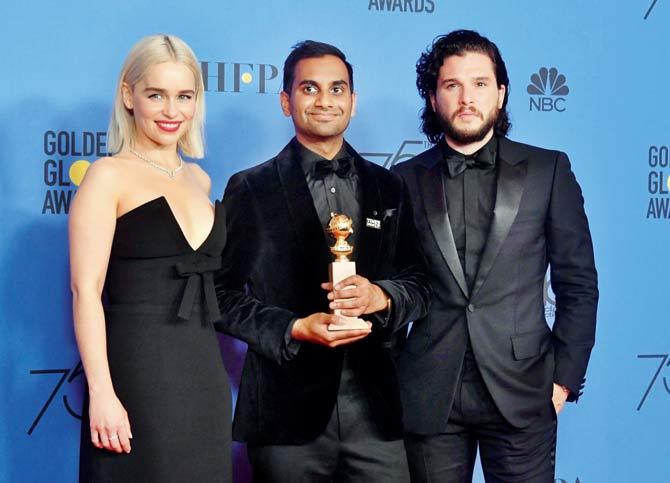Feminism is a lived practice; it's not just about the choices we make, but the judgments we are often too quick to deliver


It was Aziz Ansari's (centre) wearing of the Time's Up pin at the Golden Globes that presumably led to him being called out as a potential sexual assailant. File pic
ADVERTISEMENT
 When I unlocked the door to my apartment in Delhi on Tuesday evening, I beamed with joy. I was back home after almost a month spent being my parents' daughter, my sister's sibling, my nieces' and nephews' aunt, my neighbours' neighbour... all of which was enjoyable, but had made me miss my solitude. I had also run out of ingeniously polite ways to defend my blatantly greying hair, my stubbornly un-married status, and my reluctance to participate in hetero-normative activities that define middle-class living.
When I unlocked the door to my apartment in Delhi on Tuesday evening, I beamed with joy. I was back home after almost a month spent being my parents' daughter, my sister's sibling, my nieces' and nephews' aunt, my neighbours' neighbour... all of which was enjoyable, but had made me miss my solitude. I had also run out of ingeniously polite ways to defend my blatantly greying hair, my stubbornly un-married status, and my reluctance to participate in hetero-normative activities that define middle-class living.
The next day, I blared music on my iPad and danced along as I draped old hand-woven cotton saris in place of chiks on my curtain rods, so I could experience the waning winter light differently, allowing it to bathe the insides of each room through the filtered colour-schemed warmth of the textiles. I now don't need to check the time, I know it through my observation of the sunlight on my marble floors, and then through the sky's swallowing of the sun in the inch of sky in the looming distance outside my bedroom window, the one by which my writing desk is stationed. Yet, earlier today, I revisited my astonishment when I re-read page 76 of Helene Cixous' What is it O'Clock? from her collection of essays, Stigmata. "'What time is it?' is the best-known fateful question, the one we repeat ten times an hour with automaton lips, and time doesn't pass, the one we listen to with the tips of our ears, the gravest question in its familiar appearances, the question that admits our anxiety without our knowledge, the most wily, the least recognisable, the one that announces. Something is going to happen."
Incidentally, 'Time's Up' was the overarching refrain adopted by Hollywood's female A-listers at the Golden Globes. It was Aziz Ansari's wearing of the definitive pin that presumably led to him being called out as a potential sexual assailant. I had been asleep in a gorgeously designed room at the Project Café in Goa when all the events that would come to pass came to pass; the second-hand testimony on the website, Babe, and alarmingly soon enough, the gaslighting by publications like Atlantic and New York Times. It all came as another violent punch in the face to feminism. Not Grace's telling of her story, however anonymously, but the reception of it by the mainstream press that had chosen to selectively offer themselves as sounding boards for misogynists in feminist clothing. It was all tragically predictable; the de-legitimising of her narrative by columnists, both men and women, for over-enthusiastically jumping on the #MeToo bandwagon; for crying assault when there was allegedly no ostensible grounds on which to claim violation; for using 'anonymity' as a weapon and as a method of denying her culpability. Yet another woman was thrown under the bus, for daring to tell her story and in doing so, make sense of her own feeling of violation she had been wrestling with. One columnist suggested she pit the whole experience down to bad sex and move on.
I am once again led to wonder, how much longer must we, as feminists, put up with this authorial theft; with the media honing in on our stories not to give them more authority but to steal them from under our noses and sensationalise them into click-baity schoolings on how to be better patriarchal subjects; with closet misogynists posing as feminists trying to police the content, span, and scope of our rage? What has made us so reactionary as a civilization, so closed to depth in perspective, so narrow-minded in our polemics, so quick to persecute and execute at will, without even the courtesy of small degrees of self-awareness?
What is it O'Clock? It is time for us, as members of a historically marginalised gender as well as our non-cisgender counterparts, not to consume what is doled out to us in the mainstream media at face value. It is time for us to question all predominant narratives with the same circumspection with which we must examine our own prejudices, our notion of agency, and our delusions of powerlessness. Feminism is a lived practice, an ideology and a philosophy that demands a daily engagement, through continual meditation not only on the choices we make but the judgments we are often too quick to deliver. We must live by example. We must take care to decipher how privilege operates, and how we are all differently privileged, and therefore don't always have the same access to power and agency. Feminism involves copious amounts of empathy, besides the knowledge that if we are not entitled to tell our stories, then we have accomplished nothing. And if we do not listen to other marginalised communities as they tell us their stories, we are ourselves not deserving of any audience. To be woke is to know intuitively that there must never be a time for misogyny, that we must not tolerate or indulge it in any form, because to do so is to vociferously assert its existence and our complicity in its perpetuation.
Deliberating on the life and times of Everywoman, Rosalyn D'Mello is a reputable art critic and the author of A Handbook For My Lover. She tweets @RosaParx. Send your feedback to mailbag@mid-day.com
Download the new mid-day Android and iOS apps to get updates on all the latest and trending stories on the go
 Subscribe today by clicking the link and stay updated with the latest news!" Click here!
Subscribe today by clicking the link and stay updated with the latest news!" Click here!







